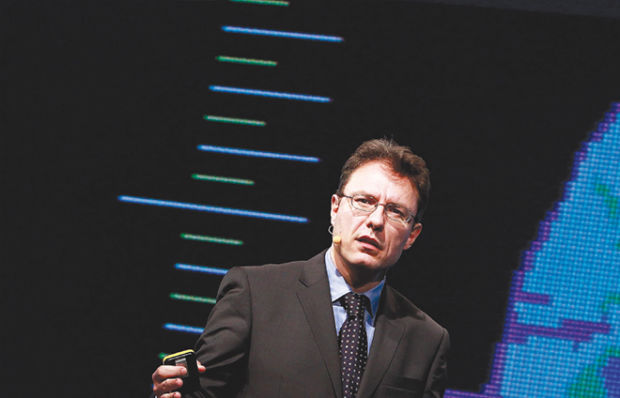
UNILOG 2015: 5. Evrensel Mantık Dünya Kongresi ve Okulu, 20 Haziran 2015 tarihinde İstanbul Üniversitesi Edebiyat Fakültesi‘nde başlıyor.
Oxford Internet Institute öğretim üyesi ve Google Danışma Konseyi üyesi Prof. Dr. Luciano Floridi; UNILOG 2015: 5. Evrensel Mantık Dünya Kongresi, Workshop on Logic and Information kapsamında, 30 Haziran 2015 tarihinde, saat 09:30‘da, “In search for a conceptual logic of information” başlıklı bir konuşma yapacaktır.
UNILOG 2015: 5. Evrensel Mantık Okulu (20-24 Haziran 2015):
http://www.uni-log.org/start5s.html
UNILOG 2015: 5. Evrensel Mantık Dünya Kongresi (25-30 Haziran 2015):
http://www.uni-log.org/start5cong.html
Davetli Konuşmacıların Listesi
- Melving Fitting (Dpt of Mathematics and Computer Sciences, City University of New York, USA): “Cut-free proofs for more and more logics”
- Graham Priest (City University of New York, USA): Workshop Philosophy of Non-Classical Logics
- JC Beall (Department of Philosophy, University of Connecticut, USA and University of Tasmania, Australia): “There is no logical negation”
- Storrs McCall (McGill, Canada): “Connexive logic based on an incompatibility operator”
- Luciano Floridi (Oxford Internet Institute, Oxford, UK): “In search for a conceptual logic of information”
- Ernest Lepore (Rutgers Center for Cognitive Science, Rutgers University, USA): “Discourse and logical form”
- Olivia Caramello (Dpt of Mathematics, University of Paris 7, France): “The theory of topos-theoretic ‘bridges’, five years later”
- Juliana Bueno Soler (State University of Campinas – UNICAMP, Brazil): “Paraconsistent probability theory: betting rationally under contradiction”
- Elena Dragalina-Chernaya (University Higher School of Economics, Moscow, Russia)
- Ahti-Veikko Pietarinen (University of Helsinki, Finland and Tallinn University of Technology, Estonia): “The idea of scope in logical diagrams”
- Irina Starikova (University of São Paulo, Brazil): “Creativity and visualisations in mathematics”
- Ekaterina Kubyshkina (University Panthéon Sorbonne, Paris 1, France): “Truth-functional alternative to epistemic logic and it’s application to Fitch’s paradox”
- Julie Brumberg-Chaumont (CNRS, Paris, France and European University Institute, Florence, Italy): “From syllogisms to syllogistic consequences: a turning point in the history
- João Marcos (Department of Informatics and Applied Mathematics, UFRN, Natal, Brazil): “Consequiland: on logics with many dimensions”
- Roman Murawski (Adam Mickiewicz University, Poznan, Poland): “On the way to modern logic — the case of Polish logic” of logic”
- Una Stojnic (Dept of Philosophy, Rutgers University, USA): “One’s Modus Ponens: classical logic and semantics for modality”
- Samet Büyükada (Department of Philosophy, Istanbul Medeniyet University): “Hypothetical syllogism in Avicenna”
- Christian Strasser joint work with Jesse Heyninck (Ruhr-University, Bochum, Germany): “Argumentation semantics for adaptive logics”
- Rodrigo Freire (University of Brasilia, Brazil): “First-order logic and first-order function”
- Gordana Dodig-Crnkovic (Mälardalen University, Sweden): “A dual representation theory of quantum Systems and its ontological consequences”
- Ahmet Çevik (Middle East Technical University, Ankara, Turkey): “Is the Church-Turing thesis the new Pythagoreanism?”
- Gianfranco Basti (Pontifical Lateran University, Vatican City): “A dual representation theory of quantum Systems and its ontological consequences”
- Eros Corraza (LCLI, The University of the Basque Country, Carleton University, Ottawa ON, Canada): “Identity Statements, Doxastic Co-Indexation, and Frege’s Puzzle”
- Jaan Valsiner (Clark University, USA): “James Mark Baldwin’s developmental logic: a century later”
- Vinod Goel (York University, Toronto, Canada): “Is there a logical reasoning module in the brain?”
- Tony Veale (UCD School of Computer Science and Informatics, Dublin, Ireland)
- Maarten McKubre-Jordens (University of Canterbury, Christchurch, New Zealand): “Invitation to non-classical mathematics”
Düzenleyen Kurumlar